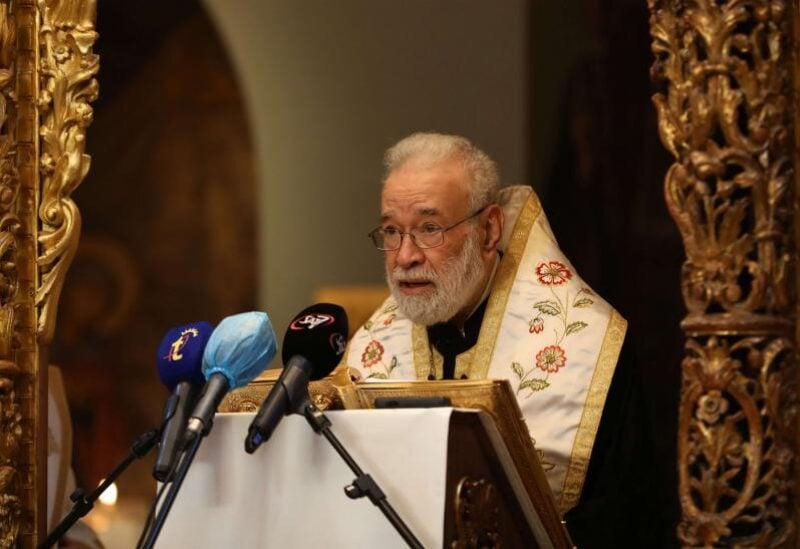
Greek-Orthodox Metropolitan Bishop of Beirut, Elias Audi
“What would the situation be like if a female candidate was chosen for the presidency?” asked Beirut’s Metropolitan Greek Orthodox Archbishop Elias Aoude, during his Sunday sermon.
He added: “Since the establishment of the Lebanese state, we’ve been having only male presidents, who were powerful sometimes and impotent other times.”
Aoude considered that “electing a female president will expose the weakness of men who consider their positions as properties, while women — in their capacity as housewives, mothers, employees, or any other role — are always restless.
“So, why not let women take charge of the country’s affairs, just like many other countries that have become pioneers thanks to their female presidents?”
Lebanese political forces have been struggling to name a successor to former President Michel Aoun since last year, to put an end to the vacuum that is paralyzing state institutions.
With male party leaders holding the keys to the country’s political decisions for decades, Lebanese women are still excluded from the main decision-making positions in the country — including the presidency, premiership and parliamentary speaker — despite their wide presence in other areas.
Randa Al-Yasir, an expert on women’s affairs, told Arab News that “the main pretexts used against the political participation of women stem from the societal culture and traditions, which have always allowed the male mentality to be the final arbiter in naming female candidates,” adding that clerics’ opinions played a big role in influencing people.
She added: “Archbishop Elias Aoude’s stance in his sermon was remarkable, as he broke the stereotype against women in positions of power.
“He clearly encouraged the assumption of power by patriotically equal men or women to rule the country.
“This recognition by clergymen will contribute to changing that culture, which has deprived women from accessing higher national positions.”
Two women from outside the traditional political system have announced their candidacy for the presidency — a position allocated for a Maronite personality — in succession to Aoun.
The first candidate is Tracy Chamoun, who is Lebanon’s former ambassador to Jordan and the granddaughter of Camille Chamoun, the second post-independence president.
The second candidate is May Rihani, who is an author, and an expert on girls’ education and women’s empowerment.
The names of Chamoun and Rihani were absent during the 11 parliamentary sessions held for the presidential elections.
The female candidates were not elected by any of the current deputies, including reformist and independent MPs, due to the ongoing political tensions.
Although Lebanese women won the right to vote in 1952, and despite the presence of an active feminist movement, women’s representation in political affairs remains below expectations.
Eight women won parliamentary seats in the 2022 elections, some of whom were active protesters during demonstrations in 2019.
The feminist movement in Lebanon, in cooperation with international bodies, is currently working on increasing female representation in municipal councils and helping more women assume the position of mayor.
It is undecided whether municipal elections will be held next May, or if the terms of the current councils will be extended amid the presidential vacuum.
Meanwhile, during a seminar organized by the UN Development Program, the head of the Seeds for Legal Initiatives organization said that laws that are unfair to women have turned them into “second-class citizens who always depend on male guardians.”
She reaffirmed that “women’s engagement in politics is not a privilege, but an inherent and obvious right in the face of the aggravation of political forces stigmatized by blatant masculinity resulting from the accumulation of public impotence and corruption.”
Joelle Abou Farhat, president of the Fiftyfifty nongovernmental organization in Lebanon, expressed her fear of “the limited political representation of women in parliament, and the presence of only 600 women in municipal councils out of 12,000 municipal positions.”
She added that “women do not need guidance, but empowerment.”
Hezbollah is against women’s participation in politics, and none of the electoral lists supported by the party included a female candidate.